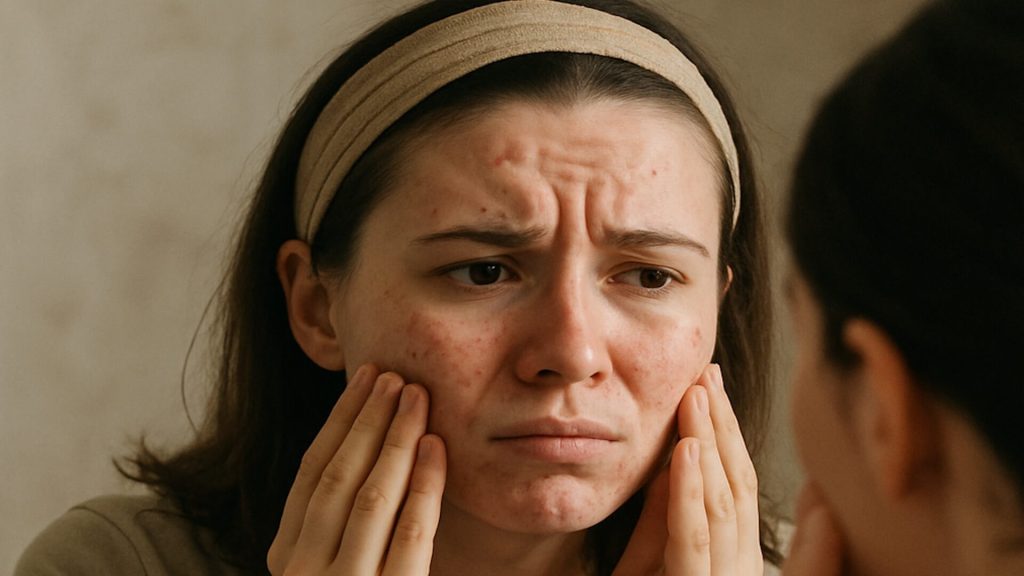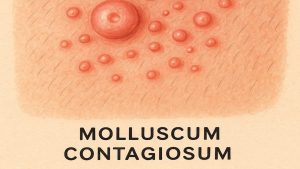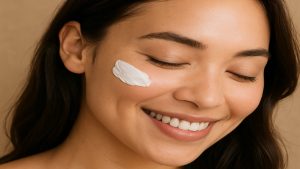- Skin issues lower confidence & trigger anxiety
- Stress raises cortisol & worsens skin conditions
- Anxiety causes hives & skin-picking habits
- Holistic care improves skin & mental health
- Monderma’s tailored skincare boosts confidence safely
The skin, the body’s largest organ, reflects both physical and emotional health. Stress, anxiety, and other psychological factors can intensify visible skin issues, while chronic conditions may, in turn, erode confidence and self-esteem.
This article explores how mental wellbeing and skin health are deeply connected, how stress affects the skin, how skin conditions influence mood, and how a balanced, holistic approach can support both.

The Bidirectional Impact: Skin & Psyche
How Skin Conditions Influence Mental Health
Visible skin concerns like acne, eczema, and psoriasis can significantly affect emotional wellbeing. Research shows that a large proportion of dermatology patients experience depression or anxiety related to their condition [1].
Persistent visibility and stigma may lead to social withdrawal, reduced intimacy, or avoidance of public settings. For instance, ectoparasitic conditions such as scabies can cause feelings of shame and disgust, delaying care [2].
Over time, the emotional burden creates a cycle, in stress worsens skin inflammation, which heightens distress and further aggravates the condition.
Psychological Effects Of Specific Skin Conditions
| Skin Condition | Psychological Effects |
|---|---|
| Acne | Reduced self-esteem, anxiety, avoidance of social contact |
| Atopic Dermatitis | Social isolation, frustration, dependency in children |
| Psoriasis | Shame, helplessness, depression, suicidal thoughts |
| Rosacea | Embarrassment, anxiety, avoidance of triggers |
| Ageing Skin | Diminished confidence, stress, obsessive behaviours |
| Hyperpigmentation | Low self-esteem, cultural distress, social avoidance |
Table 1: Overview of the connection between mental wellbeing and skin health
Psychological Factors Shaping Skin Health
Stress & Its Impact on Skin
Stress triggers cortisol release, which increases oil production and inflammation. This can exacerbate acne, eczema, and psoriasis, as well as slow wound healing. Chronic stress also weakens the skin barrier, leading to dryness and sensitivity.
Anxiety & Skin Manifestations
Anxiety often shows up through itching, hives, or hair loss, and may lead to compulsive behaviours like scratching or skin picking [8]. These habits intensify visible irritation, worsening both the skin and psychological state.
Psychological Skin Disorders
Conditions like trichotillomania (hair-pulling) or dermatillomania (skin-picking) stem from anxiety or trauma. Addressing both the emotional cause and dermatological damage through therapy and dermatological support yields the best outcomes [2].
| Psychological Factor | Effect On Skin |
|---|---|
| Stress | Elevated cortisol, excess oil, delayed healing |
| Anxiety | Hives, itching, skin-picking |
| Compulsive Disorders | Visible damage from repetitive behaviours |
Table 2: Psychological factors and their impact on skin condition
The Skin As A Mirror Of Mental Health
Healthy, balanced skin often reflects a calm mental state. Conversely, flare-ups, dullness, or irritation may indicate chronic stress or emotional fatigue.
Addressing mental wellness can restore visible vitality, reinforcing how the psyche manifests through skin health.
Physical Contact & Emotional Regulation
Positive physical touch releases oxytocin, reducing cortisol and fostering emotional balance [2]. Skin conditions, however, may deter touch due to fear of judgement, creating isolation. Encouraging supportive environments helps individuals reclaim confidence and connection, improving overall wellbeing.
Image Skincare & Self-Confidence
Maintaining a consistent skincare routine promotes calm and structure, enhancing emotional control. Clinical improvement in the skin’s appearance can restore self-esteem and reduce anxiety.
Monderma’s prescription skincare, formulated by GPhC-registered prescribers, targets conditions like acne, rosacea, and hyperpigmentation, helping individuals regain confidence through visible, evidence-based results.
Why Skin Conditions Resonate Deeply
Because skin is visible, its changes can evoke social stigma or misconceptions about hygiene, especially with conditions like scabies [2]. These assumptions heighten feelings of disgust or shame, affecting personal relationships and emotional intimacy. Addressing both perception and treatment is vital to restoring trust and self-image.
Monderma’s Personalised Skincare Solutions
Monderma provides tailored prescription skincare combining actives like tretinoin, adapalene, and azelaic acid in a vegan hyaluronic base. These formulations target inflammation, pigmentation, and ageing to improve texture and tone.
By restoring the skin’s health, these treatments help rebuild confidence and support emotional wellbeing.
Strategies For Managing The Skin–Psyche Connection
Holistic Skincare Approach
Combining dermatological care with mental health strategies offers lasting results. Balanced nutrition, exercise, and sufficient sleep enhance both skin repair and emotional regulation [2].
Stress Management Techniques
Mindfulness, meditation, and yoga reduce stress hormones and improve inflammatory responses. Regular practice supports both clearer skin and improved mental stability [9].
Professional Support
Joint care from dermatologists and psychologists helps address both emotional and physical symptoms. Therapy alleviates anxiety and shame, while medical care resolves visible lesions, breaking the stress–skin cycle.
Conclusion: Embracing The Skin–Mind Connection
The link between skin and psyche is profound. Emotions influence inflammation, while visible conditions shape confidence. Through personalised skincare, stress management, and professional guidance, individuals can achieve both healthy skin and balanced mental health.
Discover how Monderma’s personalised formulas can support your journey, and share this article to help others understand the emotional impact of skincare.
Content is for informational purposes only. Monderma treatments are prescribed following consultation. Results and timeframes can vary. Use as directed by your prescriber.
Bibliography
- Dalgard FJ, Gieler U, Tomas-Aragones L, et al. The Psychological Burden of Skin Diseases: A Cross-Sectional Multicenter Study. J Invest Dermatol. 2015.
- Exploring the Mind–Skin Dynamics of Psychodermatology. Medical Research Archives. 2024;12(11).
- NICE. Acne Vulgaris: Management. 2021.
- Bang CH, Jeon C, Kim SH, et al. Association of Psoriasis With Mental Health Disorders. JAMA Dermatol. 2019.
- NHS. Rosacea Overview. 2023.
- Gupta MA, Gilchrest BA. Psychosocial Aspects of Aging Skin. Dermatol Clin. 2005.
- Platsidaki E, Efstathiou V, Markantoni V, et al. Self-Esteem, Depression, Anxiety and Quality of Life in Melasma Patients. Dermatol Ther (Heidelb). 2023.
- Dalgard FJ, et al. Prevalence of Anxiety Disorders in Dermatology Outpatients. J Eur Acad Dermatol Venereol. 2023.
- Pascoe MC, et al. Mindfulness Mediates the Physiological Markers of Stress. J Psychiatr Res. 2017.
Find your perfect skincare formula
Takes less than 2 minutes – see what your skin needs
Get Custom Formula













